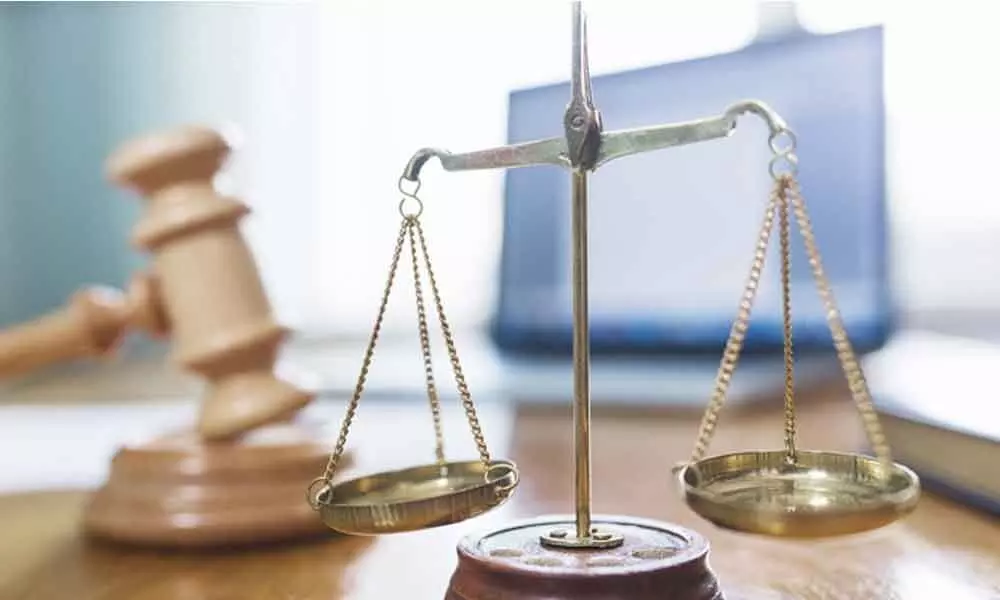More than law, the fear of law is important!

From the recent developments in the country which is reeling under the Covid-19 pandemic, all right-thinking people are constrained to ponder over certain very important facets of public administration including law enforcement in order to ensure the rule of law
From the recent developments in the country which is reeling under the Covid-19 pandemic, all right-thinking people are constrained to ponder over certain very important facets of public administration including law enforcement in order to ensure the rule of law.
It is true that despite having a huge population and religious, social, linguistic and economic disparities, as compared to other countries, we have fairly a reliable administrative and judicial structure.
We are also lucky to have fairly an honest and committed political leadership which is quite accommodative towards political dissent voiced by the opposition parties.
The print and electronic media with a few exceptions of partisan attitude, are also fairly independent. The same is also true in the case of academic and other intelligentsia.
With such a praiseworthy set up, the country has made rapid strides in the recent years. Therefore, some irritants like mob lynching, senseless opposition by terrorists, extremists and fanatic Jehadis, to lawful action in order to contain the coronavirus pandemic and vicious propaganda against the national interests by fringe elements, can be tackled easily. However, to do so, the iron political will is necessary.
Considering the lacklustre approach of the administration to the heinous crimes such as mob lynching, the latest being in Palghar district, Maharashtra, murderous attacks on doctors, nurses, para medical staff and even the police, several questions crop up about the intent and capacity of the concerned governments.
The systematic assault on everything that is Indian, in fact, began long back when the Modi government assumed power in 2014. Starting from the well orchastrated Award Wapsi drama to Bharat Tere Tukde Honge to Azadi tirades and anti CAA- NCR, the criminal gangs went amuck.
The government of the day treated these blatant acts of treason with kid gloves. This indifference bolstered these anti national elements to organise the Jamia Millia and Shaheenbagh shows on a larger scale and intensity.
The Jehadi outfits and some self-appointed messiahs of Muslims openly supported the unconditional activities in the name of freedom of expression.
The government remained almost dumb. Sadly, the apex court too, instead of taking suo motu cognizance of the explosive situation in Shaheenbagh, delayed the response. Meanwhile, some people took law into their hands and indulged in violence.
Ultimately, riots broke out in Delhi in which about 50 persons lost lives.
The COVID 19 breakout came as a saviour of the situation for the government which imposed nationwide lockdown and cleared off the protesters .
But it would be wrong to conclude that the anti-national elements have given up their fight. This has been amply proved by the open defiance of lockdown restrictions by the members and supporters of Tablighi Jamat.
Serious questions have been rightly raised about the pleaded ignorance of Delhi police about lockdown violation by the controversial Islamic organisation though its headquarters are located just at a stone throw distance from the nearby police station. What is more disturbing is that the anti-humanity stand taken by the said organisation.
Its members running into several thousands have spread all over the country and many of them are hiding in mosques and residential places. While some have been nabbed, many including the Chief, Moulana Saad are still at large. They have already infested many innocent people.
They have been indulging in animal-like behaviour and inciting other Muslims to attack health workers and police. The government in a disperate bid to control them has brought an Ordinance providing stringent punishment.
But the million dollar question is: Whether new Ordinance or Law would be able to stop or at least curb the criminal behaviour of such elements. From the experience gained so far, the obvious reply should be a big No.
The legislatures, in the past also have enacted a number of laws like NIRBHAYA Act after a gruesome incident of rape and murder, but the net result is zero. The same is the case with the laws relating to smuggling, money laundering , benami transactions and black money.
The intentions in enacting laws are always laudable. However, their enforcement remains in grey area. It is quite often seen that the rich and powerful escapes the clutches of law while the poor and unprivileged one is quickly hauled up.
The former commits offences with impunity while the latter often gets badly beaten up or dumped in police lockup some time even without registering an FIR. The scenario is, indeed, pathetic.
The law should be used for the purpose it is made.
Further, by their upright, honest and impartial behaviour the law enforcing authorities should be able to instil fear in the minds of offenders. The politicians should never muddle with the enforcement of laws. Not long ago, CBI was described as 'a parrot in the cage' by none other than the Supreme Court of India.
Last but not the least, judicial reforms should be expedited. Justice delayed is justice denied. Similarly, offenders should not be let off with minor or token punishment. Isn't it true that harsher the punishment, better will be the obedience to law.
Anti-corruption law covers deemed universities too: SC
In a significant Judgement, the Supreme Court has ruled that the deemed universities and trustees of such universities are also covered by the anti-corruption law and they could be prosecuted as public servants if they indulged in corrupt practices.
Terming corruption as the malignant manifestation of a malady menacing the morality of men, a bench of Justice N V Ramana and Justice M M Shantanagoudar set aside the Gujarat High Court order discharging the trustees of Sumandeep Vidyapeeth run by the Sumandeep Charitable Trust on the ground that a deemed university does not fall under the ambit of the Prevention of Corruption Act.
SC says neet must for pvt. minority medical colleges
While dismissing a batch of 76 petitions, including those filed by Christian Medical College, Vellore and Ludhiana, a bench of Justice Arun Mishra, Justice Vineet Saran and Justice M.R Shah of the apex court held that there is no violation of the rights of unaided/aided minority institutions under Articles 19 (1) (g) and 30 read with Articles 25,26 and 29 (1) of the Constitution of India by prescribing the uniform examination of NEET for admissions in the graduate and postgraduate professional courses medical as well as dental sciences.
Coming down heavily on the money spinning activities of such minority institutions, the bench observed : " NEET has been imposed in national interest considering the malpractices of granting illegal admissions by virtually selling the seats in derogation to rights of meritorious students," and added: "The charitable activity of education became a saleable commodity and prerogative of wealthy persons and poor students were forced to get education funded from banks."
SC convicts three advocates for contempt
In a rare act of punishing advocates for scurrilous allegations against two of its judges, the Supreme Court on April 27 convicted three lawyers for contempt of court.
A bench comprising Justice Deepak Gupta and Justice Aniruddha Bose said that the judiciary was not averse to criticism but it cannot allow the people to lower the majesty of the institution by making unfounded and baseless allegations.
The contemnors had not only forwarded complaint against judges to the President of India and Chief Justice of India but had also circulated it on social media.
The bench, however, opined that bona fide criticism of any institution including the judiciary was always welcome. But no one has right to attribute motives to a judge or to question the bona fides and competence of a judge, it added.
The action of the apex court deserves accolades. Of late, there has been a growing tendency to brow-beat judges and intimidating them. The influential and powerful lawyers when a court delivers an unfavourable judgement to them, tend to cross all limits of professionalism and even decency.
Even some of the designated 'senior' lawyers are also no exception o this kind of undisciplined and contemptuous behaviour.
Now that the apex court has sent out a clear and loud message through this case, hope all lawyers irrespective of the courts they practice will read the message and mould their professional behaviour.

















